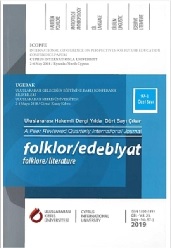Okul Öncesi Eğitim Kurumlarindaki Öğretmenlerin Psikolojik Sermaye Ve Okul Kültürü Özellikleri Arasindaki İlişkinin İncelenmesi
Investigation Of The Relationship Between Teachers' Psychological Capital And School Culture Characteristics In Preschool Education Institutions
Author(s): Figen Yaman Lesinger, Salim Akyurek, Hülya ŞenolSubject(s): Preschool education, Educational Psychology, Developmental Psychology, Sociology of Education
Published by: Uluslararası Kıbrıs Üniversitesi
Keywords: school culture; psychological capital; teacher; preschool teacher;
Summary/Abstract: Psychological capital as a psychological resource, an element of human and social capital, is a leverage power that encourages the performance and development at the individual level, and also gives a competitive advantage to the organizations by providing efficiency increase and return on investment at the organizational level. For this reason, it is an important power that should be managed in terms of organizational structuring in public, private sector or civil society organizations. The information that can be obtained at the end of the measurement of the psychological capital of the organizations provides benefit to the various decisions taken by the management and enables the management of a power that provides personal and organizational efficiency and performance increase. In order to achieve the goals of the enterprises and to obtain successful results, only the skills of the employees are not sufficient and other elements must come together and form a whole. There must be a perceived style and character of an enterprise in the internal and external environment. Each organization should have a different identity, this particular identity is called organizational culture. The main purpose of this study is to determine the relationship between psychological capital and school culture perceptions of teachers working in pre-school institutions and to determine whether psychological capital and school culture perceptions differ according to demographic factors. Preschool education institutions in the Turkish Republic of Northern Cyprus (TRNC) were selected as the Universe. The questionnaire was applied to the teachers working in pre-school education institutions in Nicosia and Famagusta in 2018. In the first part of the survey, there are demographic characteristics of the participants, the second part included the school culture scale and the third part of the questionnaire included psychological capital scale. The data obtained from the study were analyzed with SPSS 22.0 package program. Descriptive statistics such as mean, minimum and maximum values and standard deviation of the total scores of the participants obtained from the sub-dimensions of school culture and psychological capital were analyzed with the Skewness Kurtosis test. In addition, t-test analysis was used to determine the differences between the demographic characteristics of the sub-dimensions of the School Culture Scale and the Psychological Capital Scales. Pearson correlation analysis was used to determine the correlations between two scales and between the sub-dimensions of two scales used in the study. As a result of the correlation analysis, a negative, low level significant relationship was found between the school culture perceptions and psychological capital levels of pre-school teachers. It is evaluated that the results obtained from this study will contribute to the related literature, future works and the development of the subject.
Journal: Folklor/Edebiyat
- Issue Year: 25/2019
- Issue No: 97-1
- Page Range: 509-535
- Page Count: 27
- Language: Turkish

